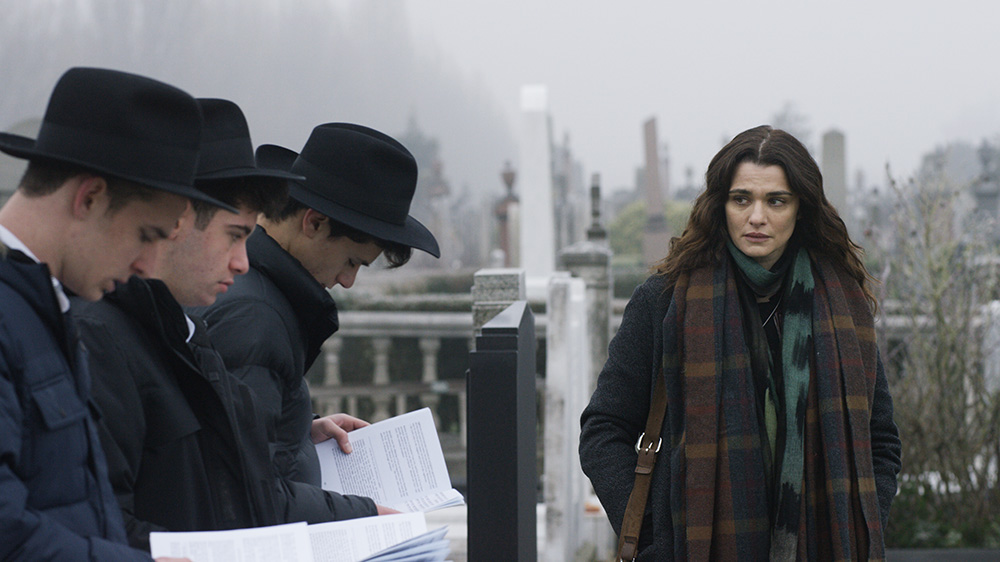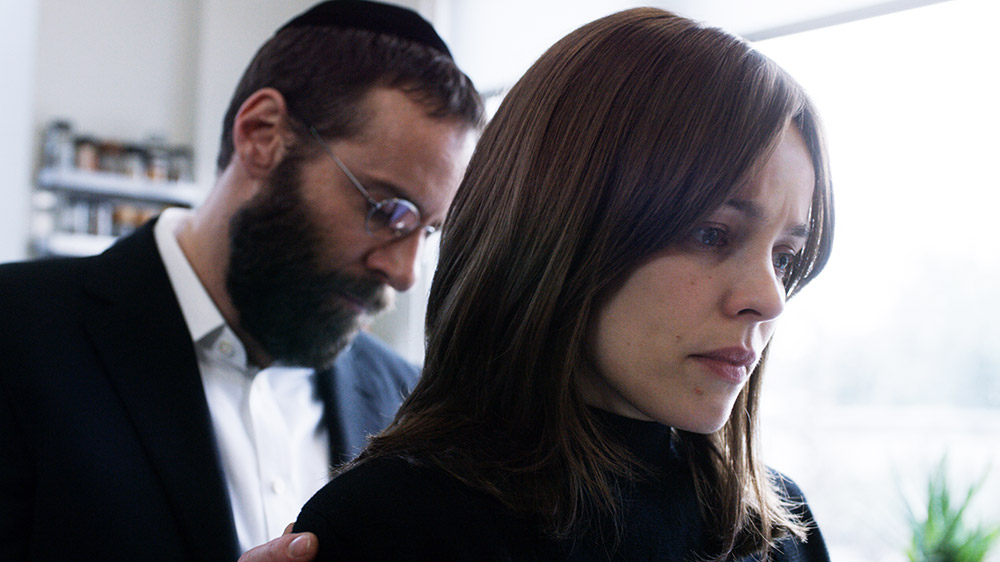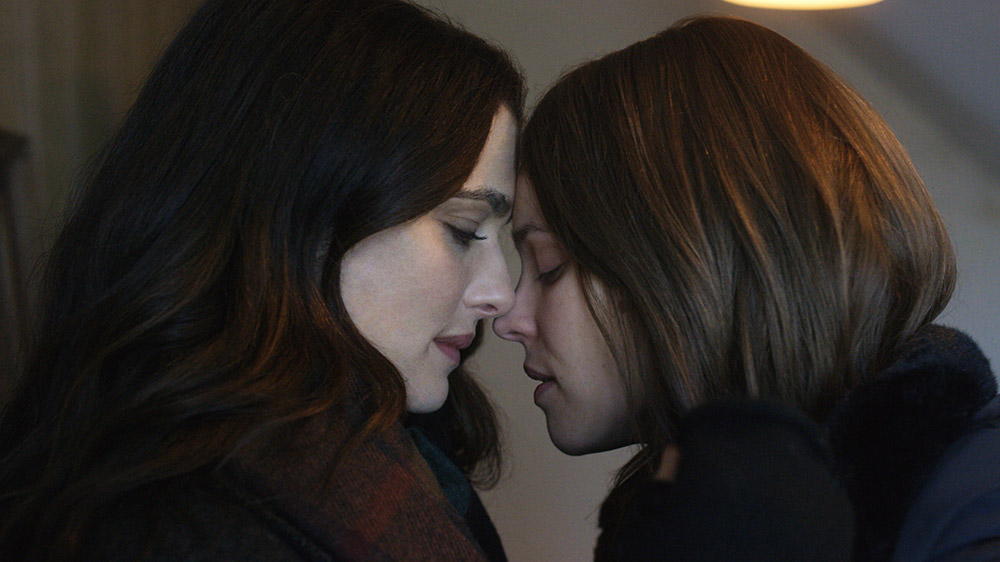Chilean director Sebastián Lelio offers a forbidden love story set within the insular context of an Orthodox Jewish community in his first English-language feature, Disobedience.
Based on the debut novel by Naomi Alderman, Disobedience is a melancholy and deliberate work of art that explores the boundaries between sexuality and spirituality; our desires and the demands of our community; and free will and compliance. In what is the follow-up to his Award-winning film A Fantastic Women (2018), Lelio directs Rachel Weisz and Rachel McAdams in this nuanced portrait of the courage and sacrifice needed to fight for one’s beliefs.
When Ronit Krushka (Rachel Weisz), an uninhibited photographer living in New York learns of her estranged father’s passing, a prominent and well-respected rabbi, she reluctantly returns to the tight-knit community in London she’d fled years earlier. Ronit’s childhood friend Dovid (Alessandro Nivola) is taken aback by her unannounced arrival and greets her cautiously: apprehensive even letting her in the door to join the other community members in mourning. Dovid was her father’s long-time spiritual protégé, now a Rabbi himself, and is the logical heir to her father’s post at the local Shul. Their initial interaction foreshadows what is to come. Ronit is an outcast who senses the intensity of disapproving eyes watching her always and reminding her that her presence is unwelcome. While grieving, she struggles to comprehend how those who had previously cared for her, could neglect to share that her father had been sick with pneumonia for some time before his death.
Dovid is quick to remind Ronit that the weeklong mourning period (or “Shiva”) must be carried out with honour to commemorate the late Rabbi. It is as if there is an expectation that she will not conduct herself with dignity. Lelio creates many moments such as this to highlight the religious repression that Ronit must have felt before leaving friends and family in favour of New York City. The circumstances of her departure are never fully disclosed, but Ronit’s indifference and unapologetic challenging of the regimented Orthodox way of life suggests it played a role.

When Ronit hears that Dovid is now married to Esti (Rachel McAdams), she can hardly hide her disbelief. The three of them had been inseparable in their youth, but it soon becomes clear that there is an intimate bond between Ronit and Esti. Their initial interactions are best categorised as aloof while they hesitantly feel each other out. But a shift occurs, gracefully signalled by The Cure’s “Lovesong” playing on the radio, causing dormant passions to reignite. Lelio treats his audience as intelligent by not spelling out the women’s shared past. Instead, Weisz and McAdams deliver poignant performances where their physicality and subtle actions provide insights into their history and feelings.
Ronit is the film’s main protagonist, but it is Esti that gives Disobedience depth and heartache. In the beginning, it’s hard to imagine Esti ever matching Ronit’s intensity or going toe-to-toe in their relationship. She is everything that her religion expects of her: dutiful, respectful, demure and obedient. We come to see that her obedience requires tremendous sacrifice as layers of her character are revealed. What’s beautiful though is Disobedience never casts doubt on her faith itself. Esti has forged a meaningful life in Ronit’s absence, but the reappearance of her old flame causes her repressed sexuality to resurface.

The scenes Rachel McAdams shares with Alessandro Nivola are paramount in understanding Esti’s internal struggle. Her interactions with her husband are calculated and forced, exposing a lack of romantic love. A striking contrast to the sense of abandon, assertiveness and spontaneity she exhibits when she’s with Ronit. But she’s quick to judge herself harshly for what she sees as a lack of control and “adolescent” behaviour. As she begins to be accepting of her feelings, the embrace and mere touch of her husband become challenging to endure. When her secret is inevitably exposed, a heated exchange between Esti and Dovid erupts in what is one of the film’s defining scenes.
Dovid could easily have been portrayed as the stereotypical jealous and controlling husband. But that is not the Rabbi’s character at all. Yes, he asserts his dominance as he begins to lose control of his life’s narrative, but he too is conflicted and faces challenging choices. It is evident that he has a great deal of love for both Ronit and Esti. In fact, except for Esti, he is the only one who recognises that the Rabbi’s passing is a tremendous loss for Ronit, despite the physical and metaphorical distance that existed between them. Dovid acknowledges that her mourning should be given space and encourages the elders in the community to show empathy.
Disobedience is slow-burning with a muted colour palette, symbolic of the modesty expected from the women in the community. The film’s thoughtful and contemplative depiction of its subjects is a triumph for Lelio but is unlikely to draw in viewers beyond the arthouse world. Remarkably honest performances demonstrate that we are free to choose our path in life, but must carry the loss that inevitably accompanies the decisions we make.
Fun Fact:
Rachel Weisz said (about costar Rachel McAdams): “We really had each other’s backs and that’s a form of love, I guess. I couldn’t have done this with anyone else.”




COMMENTS